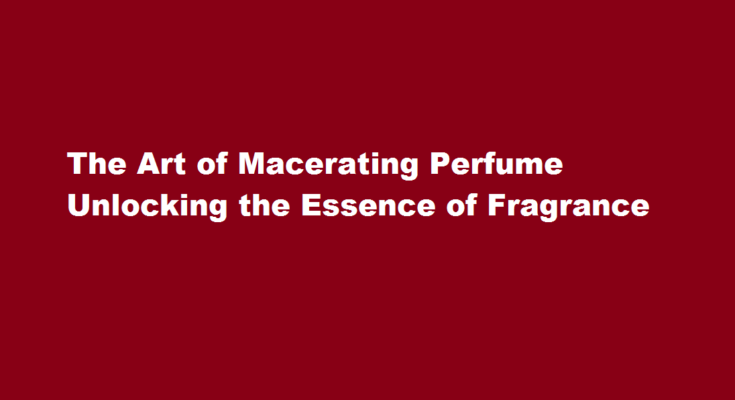Introduction
Perfume is an enchanting concoction that captivates our senses, leaving a lasting impression. Behind every mesmerizing scent lies a meticulous process called maceration, where raw ingredients blend harmoniously to create the perfect fragrance. In this article, we will explore the fascinating world of macerating perfume, revealing the steps and techniques to unlock the true essence of fragrance.
Understanding Maceration
Maceration is a crucial step in perfume making, involving the extraction of aromatic compounds from natural ingredients, such as flowers, fruits, spices, and woods. The process allows these ingredients to release their volatile oils and merge with the alcohol or oil base, resulting in a well-rounded fragrance. Maceration is a time-intensive method that requires patience and precision to achieve the desired scent profile.
Selecting the Ingredients
The quality of ingredients directly influences the final perfume. To begin, select a blend of top, middle, and base notes to create a balanced fragrance pyramid. Experiment with various botanicals and essential oils, ensuring they are of high quality and properly stored. Consider factors such as olfactory compatibility, the intensity of the scent, and the desired mood or theme of the perfume.
Preparing the Maceration Container
Choose a non-reactive container, such as glass or ceramic, to avoid any interaction with the ingredients. Ensure the container is clean, sterilized, and airtight to prevent oxidation and contamination. Transparent glass allows you to observe the color changes during the maceration process.
The Maceration Process
- Blending Measure and weigh the selected ingredients according to your desired fragrance formula. Crush or chop botanicals to release their essential oils, aiding the maceration process.
- Alcohol or Oil Base Decide whether you want to use an alcohol or oil base for your perfume. Alcohol maceration is more common and provides a quicker extraction, while oil-based maceration offers a longer-lasting scent. Choose high-proof alcohol or a carrier oil suitable for perfume-making.
- Combining and Storing Pour the alcohol or oil base into the maceration container, followed by the measured ingredients. Seal the container tightly and store it in a cool, dark place away from direct sunlight. Allow the maceration process to occur for a minimum of two weeks, periodically shaking the container to facilitate infusion.
- Aging and Straining After the initial maceration period, allow the perfume to age for an additional few weeks, allowing the scents to harmonize. Strain the perfume through cheesecloth or a coffee filter to remove any solid particles.
Perfume Adjustments and Personalization
Test the macerated perfume to evaluate its scent profile. If necessary, adjust the fragrance by adding more ingredients, increasing or decreasing their proportions. Personalize the perfume by incorporating additional notes or modifiers that enhance or modify the overall scent. Continue to age and evaluate the perfume until you achieve the desired outcome.
FREQUENTLY ASKED QUESTIONS
What is maceration in perfumes?
Maceration is a widely used technique for extracting the oils from flowers that are then utilized to create particular perfumes. In perfume development, the more well recognized reference is the process of aging a final perfume blend in a container to essentially “build” the aromatic presentation.
Why do we need to macerate perfume?
Maceration is the process of allowing the different fragrance oils to blend together in a solvent, typically alcohol, for a period of time. During maceration, the fragrance oils dissolve into the solvent and create a unified scent.
Conclusion
Maceration is a labor of love that transforms raw ingredients into captivating perfumes. By understanding the process and following the techniques outlined above, you can create unique fragrances that reflect your personal style and taste. Remember, macerating perfume requires patience, experimentation, and an artistic touch. So, dive into the enchanting world of fragrance creation and let your olfactory senses guide you to new aromatic horizons.
Read Also : How to Mark Messages as Unread in WhatsApp A Comprehensive Guide



